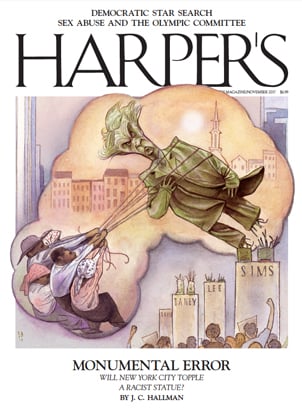Inside the November Issue
Rebecca Solnit, J. C. Hallman, Vivian Gornick, Dale Maharidge, and more
 For the last few years, Confederate monuments have been toppling throughout the South—a process that has only accelerated since the violence in Charlottesville in August. There have been fewer such disputes north of the Mason-Dixon Line. Yet New York City, which has never removed a statue for ideological reasons, may now tear down its bronze likeness of J. Marion Sims, the so-called Father of Gynecology. Sims owed much of his renown to a series of experimental surgeries he performed on young enslaved women during the 1840s. His contemporaries hardly blinked at this dubious arrangement—hadn’t the experiments allowed Sims to cure vesicovaginal fistula, a widespread and horrific disorder? But as J. C. Hallman reveals in “Monumental Error,” much of the surgeon’s career was an exercise in self-promotion and ethical corner-cutting, which left many of his patients mutilated or dead. At the same time, Sims always thought he was curing something. How, then, do we assess the legacy of such an ambiguous figure? How do we choose to memorialize the past with the full knowledge that, in Hallman’s words, “history is fluid, but bronze is not”?
For the last few years, Confederate monuments have been toppling throughout the South—a process that has only accelerated since the violence in Charlottesville in August. There have been fewer such disputes north of the Mason-Dixon Line. Yet New York City, which has never removed a statue for ideological reasons, may now tear down its bronze likeness of J. Marion Sims, the so-called Father of Gynecology. Sims owed much of his renown to a series of experimental surgeries he performed on young enslaved women during the 1840s. His contemporaries hardly blinked at this dubious arrangement—hadn’t the experiments allowed Sims to cure vesicovaginal fistula, a widespread and horrific disorder? But as J. C. Hallman reveals in “Monumental Error,” much of the surgeon’s career was an exercise in self-promotion and ethical corner-cutting, which left many of his patients mutilated or dead. At the same time, Sims always thought he was curing something. How, then, do we assess the legacy of such an ambiguous figure? How do we choose to memorialize the past with the full knowledge that, in Hallman’s words, “history is fluid, but bronze is not”?
In “Pushing the Limit,” Alexandra Starr explores the U.S. Olympic Committee’s efforts to combat sexual abuse in sports. The extent of such misconduct, almost always by coaches, is staggering. The traditional response has been to quietly suspend abusers, or avoid the subject entirely—which is precisely what has protected such predators, Harvey Weinstein among them, for decades at a time. Now the U.S.O.C. has unveiled SafeSport, a watchdog group meant to investigate abuse claims. It seems like a step in the right direction, but Starr is skeptical about the group’s ability to transform sports culture, in which coaches are treated as household gods. Instead, SafeSport may well end up, as one former coach wearily put it, a “toothless tiger.”
While the Republican Party keeps struggling to absorb Donald Trump—it’s like an organ transplant gone awry—the Democrats, too, seem unsure of the best path forward. Should they rely on the old centrist approach (and the old centrist candidates), which blew up in their faces in 2016? Or should they recruit a whole new generation of Democrats and try to work outside the clapped-out party structure? Amanda Litman, the former Hillary Clinton operative at the heart of Lisa Rab’s “Star Search,” has put her chips on the second approach. Her organization, Run for Something, enlisted and coached millennial candidates for local office across the country in June. The electoral results were a mixed bag—but the organization’s success (if that’s the right word) may be measured by its slow-motion absorption by the Democratic Legislative Campaign Committee.
In “Bumpy Ride,” Dale Maharidge describes the reverse evolution of our infrastructure, as paved roads across the nation crumble, and municipalities turn to an unlikely solution: gravel. Vivian Gornick reckons with the shape-shifting masterpiece that is Sons and Lovers, and the ways in which a great novel seems to reconfigure itself each time we return to it. In “Preaching to the Choir,” Rebecca Solnit rehabilitates that hoary phrase. “To win politically,” she argues, “you don’t need to win over people who differ from you, you need to motivate your own.” And in “Bad Dog,” Rafil Kroll-Zaidi delivers a sad, sinister, exquisitely controlled work of fiction. (Note to canine lovers: this might not be your bowl of kibble, but give it a try.)
In Readings, we learn about the ideal skill set for a sex robot and the “small but keen Finnish knife with a reindeer-bone handle” that served the poet Joan Murray as a fetish object during her 1940 trek across New England. There is a miniature fiction by Laszlo Krasznahorkai, a poem by George Oppen, and an account of the 2012 trial of Pussy Riot, in which the mean-spirited plaintiffs pop up like action figures to denounce the three defendants. (Russian justice in action: “The dog vomits at the entrance to the courtroom; the judge steps over the puddle.”) Finally, we have a formidable troika of critics—Christine Smallwood, Lidija Haas, Dayna Tortorici—and the usual cornucopia of enlightenment in Findings: “Dry climates produce languages with fewer vowels.”


